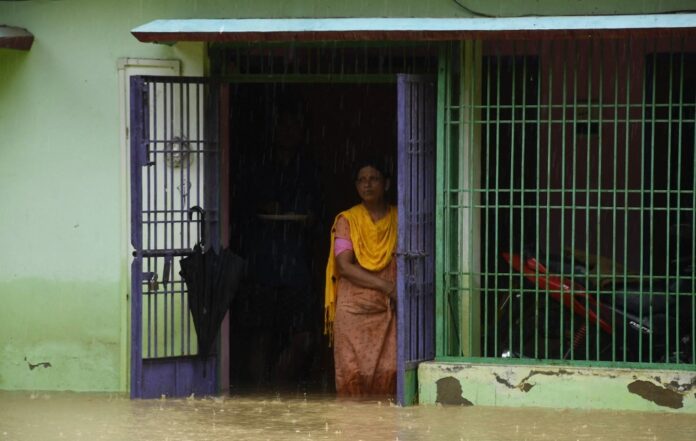NEW DELHI: Unprecedented flooding in northeast India has left a trail of destruction, with villages submerged, crops destroyed and dozens killed by landslides or rising floodwaters, authorities said on Tuesday.
Up to 5 million people are believed to be marooned after heavy monsoon rain brought the worst floods in decades to Assam.
Authorities said that 33 of the state’s 35 districts have been inundated, and at least 43 people killed by floods and landslides in the past week.
Entire settlements across the state have been engulfed by rising floodwaters and agricultural fields turned into swamps of mud.
“A large number of the population, at least 5 million people are affected,” Gyanendra Dev Tripathi, CEO of Assam State Disaster Management, told Arab News.
“This year, the rain has been at least 400 percent more.”
At least 2,000 roads in the state have been damaged. The Barak Valley area in the southern part of Assam, which consists of Cachar, Helaknadi and Karimganj districts, has been completely cut off from road and communication networks.
“It’s a challenging situation,” Tripathi said. “Roads are opening and then getting closed due to landslides.”
Extreme weather is becoming increasingly frequent in South Asia, raising fears that climate change could lead to even more serious disasters in the near future.
Normally the monsoon brings heavy rainfall to the region between June and October, often triggering floods, especially in low-lying areas, such as Assam, where rivers swollen with water pouring off the Himalayas burst their banks.
But this year, heavy rains began a month earlier.
“The first spell of rain was from May 11 to 19, but the rainfall was 400 to 500 millimeters for three days. That time it was also flooded. The second spell started on June 11. Initially it was 300 or 400 millimeters, but on June 15 and 16, that is for two days, we got 1,000 millimeters of rain in 24 hours,” R.K. Jenamani from the Indian Meteorological Department told Arab News.
“Earlier, the heavy rainfall would happen in the neighboring states and Assam would be affected, but this time the rainfall itself was Assam.”
Rahul Chakraborty, a journalist in Cachar, one of the most affected regions, told Arab News over the phone that the situation was “very grim,” with worsening food shortages.
“People here say that they have never seen this kind of rain in the region,” he said. “The whole Barak Valley is cut off from the mainstream and people are marooned at home. The government has promised to drop food packets, but it has still not started.”
Isfaqul Hussain, a social worker involved in relief efforts in southern Assam, said that some areas remain inaccessible and it is impossible to bring aid.
“This is really unprecedented rain. I have never seen this kind of rain in my life,” he said.
“People are facing difficulty in getting drinking water. In some areas in Lower Assam, people are stuck in their houses and many have lost everything. They are struggling to survive.”

